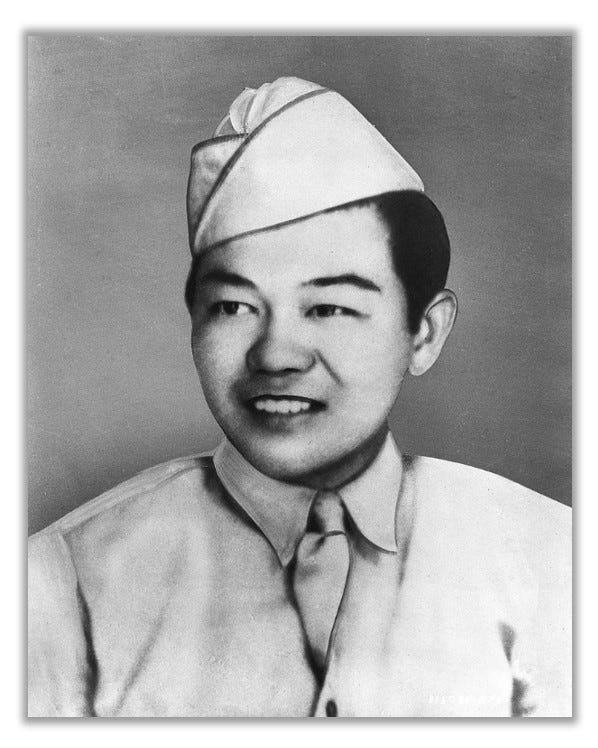Medal of Honor Monday: Sadao Munemori
Joining the Army, the son of immigrants wrote, “was a big decision I had gone over and over again at nights . . . . I think I did right by enlisting because my home is here in the U.S. . . . "
At about this time in 1946, a solider is awarded the Medal of Honor. Pfc. Sadao “Spud” Munemori was the first Japanese American to be awarded the Medal. He’d joined the Army even before the United States entered World War II.
Unfortunately, his service didn’t shield his widowed mother from the general suspicion surrounding Japanese Americans in those days. Instead, she was sent to an internment camp in the months after Pearl Harbor, as too many Japanese Americans were.
Nevertheless, Munemori knew that the Army was where he needed to be.
Joining the Army, he wrote his family, “was a big decision I had gone over and over again at nights when you all were sleeping. I think I did right by enlisting because my home is here in the U.S. and it helped a lot to bind the family together more than ever.”
His mother must have agreed, despite all she was going through. She kept a blue star flag on the wall in her barracks, a proud display of her son’s service.
Munemori was soon selected for Military Intelligence Service (MIS) language school, but he wanted to join his fellow Nisei (American children of Japanese immigrants) in combat. A segregated unit had been created, and he accepted a demotion so he could join.
He was soon overseas, serving in both Italy and France and sending home descriptions of his experiences.
War is “hell,” he said a letter to his sister. “[I]t’s no place for anybody to be. I never knew I could pray so darn seriously until they started shelling holy hell out of us one day.” But his letters could also take a cheerful turn. “I had a couple of close calls with fate,” he wrote in 1944, “but I guess it wasn’t time for me to go see Pop!”
His Medal of Honor action came in April 1945. Munemori’s unit was to penetrate the German’s final and main defensive line in the Apennines Mountains in Italy.
The enemy fire raining down on the Nisei was intense. Munemori’s squad leader was injured, leaving Munemori to take command. The brave young man met the challenge head-on. He was soon racing through gunfire towards two machine gun nests. His “frontal, one-man attack,” as his Medal citation calls it, enabled him to take each one out with a grenade.
As he withdrew, he was pounded by “murderous fire” and numerous enemy grenades. He ran for a shell crater that was already occupied by two of his fellow soldiers. Just as he got there, an enemy grenade bounced off his helmet and fell onto the ground near the other two men. There wasn’t time to throw it out. There wasn’t time to do anything except what Munemori reflexively did: He threw himself on the grenade, saving his fellow solders—but not himself.
His wounds were mortal.
On March 13, 1946, Munemori was awarded the Medal of Honor for his selfless bravery. About a year later, a troop ship was renamed in his honor.
It was the same ship that had brought his fellow Nisei home from war.
The latter honor is interesting because of a conversation Munemori had with his older sister, Yaeko, when he was just 8 years old. He was losing an argument but retorted: “You just wait. When I grow up, they’re going to name a ship after me.” At the time, she was dismissive, “I don’t care. I wouldn’t ride on your ship anyway.”
She’d long regretted that flip answer, of course. When she was invited to be the first to board the new USNS Private Sadao S. Munemori as it sailed into Honolulu, she proudly accepted.
Another member of the Greatest Generation who gave his country all he had to give.
Sources can always be found on my website, here.





Pvt. Munemori took a demotion and gave up a "safe" position to join in combat. A decision that ultimately cost him his life. Yet he served admirably and saved the lives of two of his fellows, while not even thinking twice about it. May he and the other Neise that served be long remembered.
Thank you Tara for another MOH Monday. God bless all who have served. Mr. Munemori for his brave actions and for his willingness to serve while his family was in an internment camp because of their race.
I knew a Japanese family who served in an internment camp during WW2 and a member of their family who served in the US Army during WW2. They were the among the most patriotic people of the Greatest Generation, in my experience.